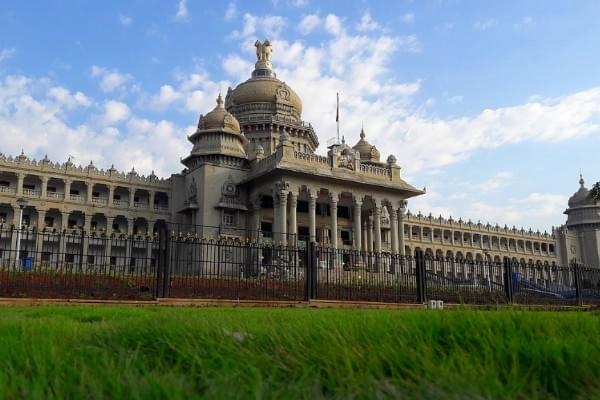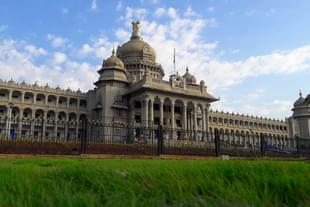Politics
Demand For Separate Statehood For North Karnataka Is Unjustified Despite Government’s Step-Motherly Treatment
Sathyajith M S
Aug 02, 2018, 01:41 PM | Updated 01:41 PM IST
Save & read from anywhere!
Bookmark stories for easy access on any device or the Swarajya app.


Ever since Janata Dal (Secular) or JDS leader H D Kumaraswamy became the Chief Minister, almost every action of his government appears to have disappointed the people of North Karnataka. Starting from his provocative statements to the partiality in allocation of the budget, the ‘mannina maga’, or son of the soil, has left no stone unturned to upset the people of that region. Recently, the Chief Minister said, “There was a strike yesterday in Kopal demanding full farm loan waiver. Today, I want to ask those who are observing strike demanding complete farm loan waiver, why didn't you remember Kumaraswamy while voting?”
All this seems to have not gone well with the people of the region and some groups have called for a bandh. Somashekar Kotambari, president of the Uttar Karnataka Horata Samiti (UKHS) had alleged step-motherly treatment being meted out to the region by the Kumaraswamy government and has cited that as the reason for the bandh.
North Karnataka comprises 13 districts, whichfaces scarcity of water and has very little to offer when it comes to natural resources. Even before this, there was a movement demanding separate statehood for the Hyderabad-Karnataka region, led by Vaijnath Patil. Patil and his group went to the extent of observing Kannada Rajyotsava, celebrated on the first day of every November, as a ‘black day’. However, after the government brought in Article 371(J) providing special status to the region, the demand for separate statehood was thwarted. Therefore, the demand for a separate statehood for the region is neither new nor will it be reasonable for the following reasons.
First, if one sees Karnataka historically, Northern Karnataka for most of the periods has been united with the southern region barring the British period. Though Mysuru and Bengaluru have been the power centres since the 18th century, historically, be it the Chalukyas, Kadambas or Rashtrakutas who ruled the region of Karnataka, all of them had their capitals in the present day Northern Karnataka. Capital of Kadambas and Chalukyas was Banavasi and Badami respectively, while the Rashtrakutas ruled from Manyaketha (Malkhed). All these dynasties were not just restricted to the northern region. They ruled over most parts of Karnataka. Therefore, historically speaking, political power centres have oscillated between the north and the south at different points of time.
Second, literary contributions from the northern region are immense. Pampa, who is considered as Adikavi, was a court poet of Chalukyan king Arikesari II and hailed from North Karnataka. Jnanpith awardees D R Bendre, V K Gokak, Girish Karnad and Chandrashekar Kambar are all natives of North Karnataka. Freedom fighter and founder of Kannada Ekikarana Movement, Huilgol Narayan Rao hailed from the Dharwad district which belongs to the northern region. In fact, the movement itself originated in Dharwad. Narayan Rao composed the state anthem of unified Karnataka ‘Udayavaagali Namma Cheluva Kannada Naadu’.
Apart from contributions to literature, one cannot ignore the contribution of North Karnataka to music. The golden era of Hindustani classical music was dominated by legendary musicians Pandit Bhimsen Joshi, Pandit Mallikarjun Mansur, Pandit Basavaraj Rajguru, Pandita Gangubai Hangal and Pandit Kumara Gandharva - all hailing from the northern region. Why would a region requiring separate state contribute so much to the culture and development of a unified Karnataka. Moreover, why would a movement for a unified Karnataka originate in a place which is in the northern region?
Third, from an economic perspective, it makes no sense to demand for a separate state for the northern region. None of the districts from North Karnataka has a per capita income of more than the state’s average. While Bengaluru Urban district has the highest per capita income of Rs 2,71,387, Kalaburagi district ranks the last with a per capita income of Rs 67,886. Whatever the reason for the low per capita income in the districts of North Karnataka, the important point which has been missed is the amount of revenue collected from different parts of Karnataka. Bengaluru alone contributes to over 50 per cent of the state’s revenue. Seeing the per capita disparities, in all probabilities, it is the southern and the coastal region, which contributes to the large chunk of the state’s revenue.
Therefore, a separate statehood for North Karnataka would mean a lack of revenue for development. Absence of a potential capital city would put the region at a further disadvantage. Despite getting lesser funds, the region would fare much better under united Karnataka when compared to a separate state. A separate state would again mean that the migrants from the northern region, who have settled in Bengaluru, would be contributing to the revenue of the southern state while the northern state will suffer.
It is evident that the feeling of oneness among all Kannadigas was not manufactured in 1956 when the State Reorganisation Act was passed, but has been there since historical times. It is only under the British that we saw the region of Karnataka being divided among Nizam of Hyderabad, Madras Presidency and Bombay Presidency. A provocative statement by a person should not be a reason for demanding a separate statehood when one considers its long term consequences. A separate statehood for North Karnataka would only mean emergence of another Andhra Pradesh, and which will have to be built from the scratch.
The present agitation for a separate statehood is just to draw the attention of the government to the problems faced by the people of North Karnataka such as droughts. Another reason may be to address the irregularities in power sharing in the cabinet. Therefore, the demand for separate statehood is not just unjustified, but also devoid of any logic and sense.
Sathyajith’s areas of interest are politics, economics, and history.





